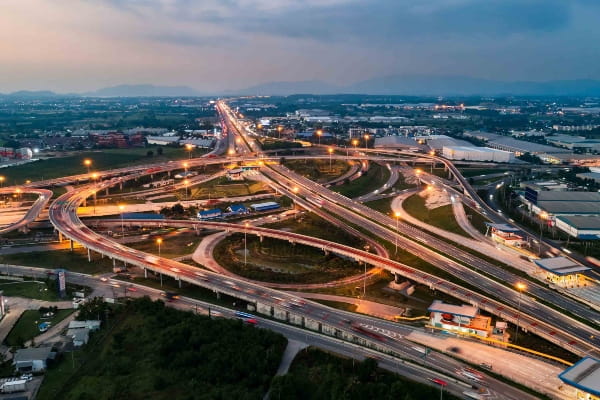-
Featured services
Harness innovation to deliver value
Ensure short-term stability as you design a roadmap for new use cases in your industry with emerging technologies.
Explore Connected Industries -
Services
View all services and productsLeverage our capabilities to accelerate your business transformation.
-
Services
Network as a Service
Popular Products
-
Private 5G
Our turnkey private 5G network enables custom-built solutions that are designed around unique use cases and strategies, and deployed, run and optimized through a full network-as-a-service model.
-
Managed Campus Networks
Our Managed Campus Networks services transform campus networks, corporate area networks and interconnected local area networks, and connect smart places and industries.
-
-
Services
Cloud Services
Popular Products
-
Cloud Migration and Transformation Services
Access the people, processes and technologies you need to deliver cloud migration projects that improve your return on investments.
-
Site Reliability Engineering Services
Get the most from your cloud investments when you harness our Site Reliability Engineering Services to support app development and lifecycle management.
-
-
Services
Edge as a Service
Client stories
-
Penske Entertainment and the NTT INDYCAR SERIES
Together with Penske Entertainment, we’re delivering digital innovations for their businesses – including INDYCAR, the sanctioning body of the NTT INDYCAR SERIES – and venues such as the iconic Indianapolis Motor Speedway, home to the Indianapolis 500.
-
Using private wireless networks to power IoT environments with Schneider Electric
Our combined capabilities enable a secure, end-to-end digital on-premises platform that supports different industries with the benefits of private 5G.
-
-
Services
Technology Solutions
Client stories
-
Services
Global Data Centers
-
Services
Digital Collaboration and CX

IDC MarketScape: Worldwide Datacenter Services 2023 Vendor Assessment
We provide a new kind of intelligent infrastructure to deliver better outcomes through technology.
Get the IDC MarketScape -
-
-
Insights
Recent Insights
-
The Future of Networking in 2025 and Beyond
-
Using the cloud to cut costs needs the right approach
When organizations focus on transformation, a move to the cloud can deliver cost savings – but they often need expert advice to help them along their journey
-
Make zero trust security work for your organization
Make zero trust security work for your organization across hybrid work environments.
-
-

Copilot for Microsoft 365
Everyone can work smarter with a powerful AI tool for everyday work.
Explore Copilot today -
-
Global Employee Experience Trends Report
Excel in EX with research based on interviews with over 1,400 decision-makers across the globe.
Get the EX report -
Discover how we accelerate your business transformation
-
About us
CLIENT STORIES
-
Liantis
Over time, Liantis – an established HR company in Belgium – had built up data islands and isolated solutions as part of their legacy system.
-
Randstad
We ensured that Randstad’s migration to Genesys Cloud CX had no impact on availability, ensuring an exceptional user experience for clients and talent.
-
-
CLIENT STORIES
-
Liantis
Over time, Liantis – an established HR company in Belgium – had built up data islands and isolated solutions as part of their legacy system.
-
Randstad
We ensured that Randstad’s migration to Genesys Cloud CX had no impact on availability, ensuring an exceptional user experience for clients and talent.
-
-
CLIENT STORIES
-
Liantis
Over time, Liantis – an established HR company in Belgium – had built up data islands and isolated solutions as part of their legacy system.
-
Randstad
We ensured that Randstad’s migration to Genesys Cloud CX had no impact on availability, ensuring an exceptional user experience for clients and talent.
-

NTT DATA and HEINEKEN
HEINEKEN revolutionizes employee experience and collaboration with a hybrid workplace model.
Read the HEINEKEN story -
- Careers
The AI revolution: why we need the right frameworks to avoid disaster
28 August 2019

Topics in this article
The fourth industrial revolution is no longer a topic for economists and future-gazers. It’s happening right before our very eyes. This new era of digitization promises to change how we live, work, interact with each other – even how we’re governed. It’s no exaggeration to say it will transform human society as we know it. AI is at the heart of this revolution, already deeply embedded in our working and private lives. But there’s danger ahead if we let this technology grow unfettered.
Governments and industry need to act now to put the right political, economic and ethical frameworks in place to manage the growth of AI – ensuring we use it responsibly and in a way that gets mass buy-in from the populace.
The revolution starts here
The benefits of AI are well understood by now. In analysing, evaluating and making decisions based on vast data sets, it’s already adding value in countless scenarios. Think of the speech recognition algorithms that power AI assistants like Alexa and Siri; the image recognition used by connected cars to identify potential hazards; or even the machine learning employed by e-commerce sites to improve the shopping experience through personalized recommendations.
It’s all AI in one form or another and it’s already having a major impact on our personal lives. But it’s set to have an even bigger impact on our working lives – and this is where we could start to see resistance.
Some AI risk factors
Although the Skynet-like doomsday scenarios painted by Hollywood, and even Elon Musk, make for great headlines, there are greater risks facing us in the nearer term.
The first is based around mankind’s existential fears of one day being replaced by machines. Many people are rightly concerned that their jobs could become obsolete as machines get smarter. There’s no way of pushing back progress, but we can manage these fears to avoid a widespread backlash against the technology. It’s vital that governments act now to develop sociopolitical initiatives that educate the populace about the social and economic benefits of this AI-driven progress whilst focusing on ways to up-skill those whose roles may be most at risk. Without it, their respective nations may well be overtaken by those who do.
The second concern is around our over reliance as a society on AI-based technologies. When critical decisions are taken by AI bots, can we be sure they’re the right decisions? Machines are seen as dispassionate but even they can have prejudices. After all, the data they build algorithms around is effectively a large collection of decisions made by in the past by fallible humans. A further challenge arises if AI applications in turn develop new iterations without human input, as per Google’s AutoML project.
Thinking clearly
When starting AI projects, it’s important to bear in mind some fundamental questions. What do I want to achieve? Which methods best support my goals? What impact will the technology have on my organization and employees? What risk might be created by these changes? How much decision-making power do I hand over the AI bot? And at what point should we expect humans to intervene?
We’re at the start of an exciting journey here; one which could result in some fantastic wins for us all. But first we need to develop the right social, ethical and even political frameworks for AI, so that the technology wonderland of today doesn’t become the dystopia of tomorrow.

